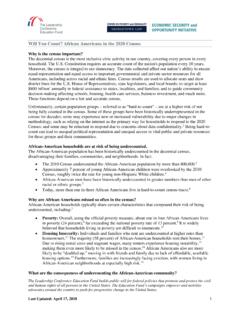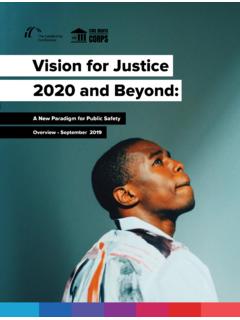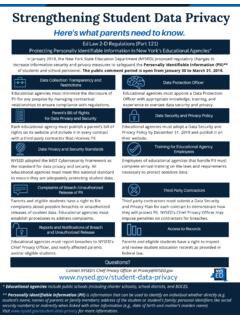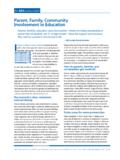Transcription of Parent and Family Engagement Provisions in the Every ...
1 Parent and Family Engagement Provisions in the Every Student Succeeds Act The Every Student Succeeds Act (ESSA) serves as the latest reauthorization of the Elementary and Secondary Education Act of 1965 (ESEA) which was last reauthorized in 2002 as the No Child Left Behind Act (NCLB). Since its inception, the intent of the law has been to raise achievement for low-income and otherwise disadvantaged children. Parent and Family Engagement and consultation have always been a key piece of the law, focused on the low- income parents of Title I-participating children. We know that gaps in educational opportunity and achievement will only be remedied when those closest to the affected students parents , families, and communities are driving decisionmaking. This brief seeks to provide advocates with a full overview of the ESSA's requirements, and opportunities, for Parent , Family and community Engagement . Funding Title I Parent and Family Engagement Set-Aside1: Each district is required to reserve at least one percent of its Title I2 funds to carry out Parent and Family Engagement activities, including those described in the written policy section below.
2 Ninety (90) percent of these set-aside funds must be distributed to schools, with priority given to high-need schools. The law further requires that parents and Family members of low-income students must3 be included in decisions regarding how these Engagement funds are spent. These Parent and Family Engagement funds must be used for at least one of the below activities: Supporting schools in training school staff regarding Engagement strategies;. Supporting programs that reach families at home, in the community and at school;. Disseminating information on best practices focused on Engagement , especially for increasing Engagement of economically disadvantaged families;. Subgranting to schools to collaborate with community-based organizations or businesses that have a track record of improving Family Engagement ; or Engaging in any other activities that the district believes are appropriate in increasing Engagement . A state must provide an assurance4 in its state plan that it will provide school districts and schools with effective Parent and Family Engagement strategies.
3 1. See Section 1116. Parent and Family Engagement . 2. Title I refers to Title I of the Every Student Succeeds Act. These funds are allocated from the federal government to the state and then to the district and school. The amount of money a district receives depends on the number and percent of students in poverty. The amount of money a school receives depends on enrollment in free and reduced price meal programs and decisions the district makes. 3. In the law there is a distinction between must (something that is required by the law) and may . (something that is allowed) by the law. Advocates can pressure states, districts and schools to take action around those things that are allowed and can seek USED enforcement when states, districts and schools fail to do something that is required. 4. An assurance is a statement in the plan that the state has complied or will comply with a requirement . such as committing that the state has given or will give districts and schools information.
4 1. Last Updated: January 19, 2016. Parent and Family Engagement Provisions in the Every Student Succeeds Act Title IV5 Statewide Family Engagement Centers6: Federal grants will be awarded to statewide organizations to establish statewide Family Engagement centers to: Assist parents in participating effectively in their children's education and helping their children meet state academic standards;. Develop and implement, in partnership with the state, statewide policy to provide services that will help to remove barriers for Family Engagement ; and Develop and implement parental involvement policies required in the ESSA. Consultation State Plans7: In order to receive funding under Title I, each state must submit a state plan to the Department of Education (ED). The law lays out requirements for developing the plan and what the plan must contain. ED has the authority to approve, deny, or ask a state to revise the plan. The department can also take action when states fail to comply with their own approved plans.
5 When developing plans, states must meaningfully consult with parents (among other stakeholders). States must allow the public at least 30 days to comment on the plan before submitting plans to ED for review. As part of his or her role in evaluating the plans, the Secretary of Education must establish peer-review teams to review submitted state plans. The teams include a variety of representatives, and parents are listed among those to be included. State Report Cards8: States must develop and provide to the public annual report cards that include information about the education provided in the state's schools. State report cards must be developed in consultation with parents and information must be provided in a language that parents understand. District Plans9: Each district must submit a plan to the state. The law lays out requirements for developing the plan and what the plan must contain. The state has the authority to approve, deny, or ask a district to revise its plan.
6 The state can also take action when districts fail to comply with their own approved plans. When developing plans, districts must meaningfully consult parents of children in schools receiving Title I funds. District plans must describe the strategies the district will employ to meet the Parent and Family Engagement requirements. If the district plan is not satisfactory to the parents of low-income students , the school district must submit any Parent comments to the state. School Support and Improvement Plans10: School districts, after being notified that a school is identified as in need of comprehensive support and improvement, must develop and implement 5. See Title IV. 21st Century Schools. This title includes a variety of programs to provide student supports, academic enrichment, extended learning and afterschool, charter and magnet schools, and Family Engagement programming. 6. See Section 4501. Family Engagement in education programs. 7. See Section 1111.
7 State plans. 8. See Section 1111(h). Annual state report card. 9. See Section 1112. Local educational agency plans. 10. See Section 1111(d). School support and improvement activities. 2. Last Updated: January 19, 2016. Parent and Family Engagement Provisions in the Every Student Succeeds Act a plan for the school to improve student outcomes in partnership with parents and other stakeholders. Schools, after being notified that their school is in need of targeted support and improvement, must also develop and implement a plan for the school, in partnership with parents and other stakeholders, to improve student outcomes. Title I Funded Activities11: Title I-funded activities themselves must be planned and implemented with meaningful consultation with parents of low-income children. Parent and Family Engagement Policies In order to receive Title I funds, districts must conduct outreach to parents and Family members and must implement programs, activities and procedures for the involvement of parents and families in Title I-funded activities12.
8 Each district must jointly develop with and distribute to families, in a language they can understand, a written Parent and Family Engagement policy. The Engagement policy must be periodically updated to reflect the needs of families and be incorporated into the district plans described above. Title I-receiving schools in the district must also distribute Parent and Family Engagement policies agreed to by the parents . School Districts: The district Parent and Family Engagement policy must describe how the district will: Involve parents in the joint development of the district plan;. Provide the support necessary to assist schools in implementing effective Family Engagement activities;. Conduct an annual evaluation of the effectiveness of the policy in improving the academic quality of Title I schools, including identifying barriers to greater participation by families, (especially Family members who are economically disadvantaged, disabled, have limited English proficiency, have limited literacy, or are a racial or ethnic minority) and use the findings to design strategies to support successful school and Family interactions and revise Engagement policies; and Involve families in schools activities, which may include establishing an advisory board to develop, revise and review the Engagement policy.
9 Title I Schools: The school parents and Family Engagement policy must describe how the school will: Convene an annual meeting, at a convenient time to which all parents of low-income students are invited and encouraged to attend, to inform parents that their school receives Title I funds, that these funds come with requirements, and that parents have a right to be involved;. Offer a flexible number of Engagement meetings at convenient times for families (for which the school may provide transportation, child care, or home visits using Title I funds);. Provide parents and families with: 11. See Section 1116. Parent and Family Engagement . 12. See Section 1116. Parent and Family Engagement . 3. Last Updated: January 19, 2016. Parent and Family Engagement Provisions in the Every Student Succeeds Act o Information about Title I-funded programs;. o An explanation of the curriculum and achievement levels the school uses; and o If requested, opportunities for regular meetings to participate in decisions relating to the education of their student.
10 Jointly develop with parents of low-income students a school- Parent compact that outlines how families, school, staff and students will share the responsibility for improved student academic achievement and develop a partnership to help students achieve state standards. o The compact must: Describe the school's responsibility to provide high-quality curriculum and instruction in a supportive and effective learning environment that enables students to meet the academic achievement standards, and the ways in which each Parent will be responsible for supporting learning, including volunteering in their child's classroom, and participating in decisions relating to the education of their children;. Address the importance of communication between families and staff through, at a minimum: Parent -teacher conferences in elementary schools, at least annually, during which the compact will be discussed as the compact relates to the individual child's achievement;. frequent reports to parents on their children's progress; and opportunities to volunteer in or observe their child's class Ensure regular two-way meaningful communication between Family members and school staff in a language they Ensure effective involvement of Parent and support a partnership among the school, parents and the community to improve student academic achievement by the following required and allowed activities: o Required: Providing assistance to parents in understanding such topics as the state's academic standards, state and local academic assessments, the requirements of Title I and how to monitor a child's progress and work with educators.











